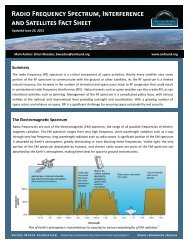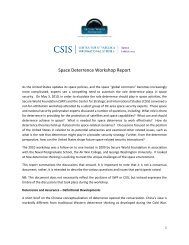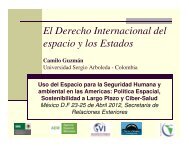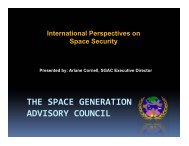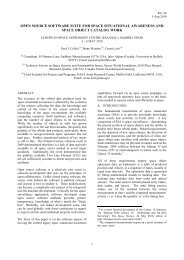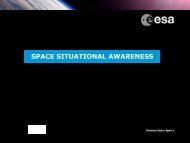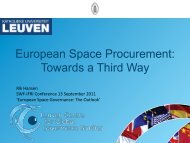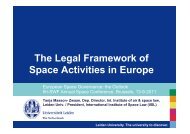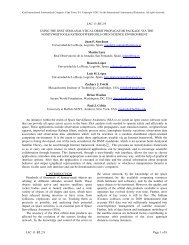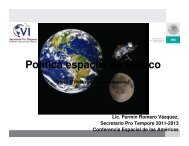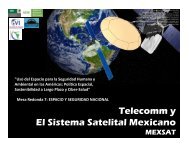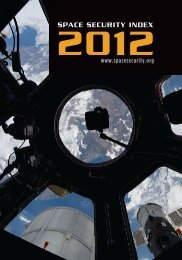Space Security Index
Space Security Index
Space Security Index
Create successful ePaper yourself
Turn your PDF publications into a flip-book with our unique Google optimized e-Paper software.
<strong>Space</strong> <strong>Security</strong> 2011<br />
70<br />
an African <strong>Space</strong> Policy, in cooperation with the Regional Economic Communities, the UN<br />
Economic Commission for Africa, and the ITU, as described below.<br />
2010 Development<br />
African regional cooperation in space on the rise<br />
During the 3rd African Leadership Conference on <strong>Space</strong> Science and Technology for<br />
Sustainable Development held in Algeria on 7-9 December 2009, Nigeria, Algeria, South<br />
Africa, and Kenya signed a regional cooperation agreement for an African Resources<br />
Management Satellite (ARMS) Constellation. 109 Coming after years of discussions, 110 it<br />
signaled increased cooperation between African countries. In a presentation to the Bengaluru<br />
<strong>Space</strong> Expo-2010 on 25 August 2010, the Director General of the Nigerian <strong>Space</strong> Agency<br />
stated that the program was open to other African countries and that Egypt had also shown<br />
interest in ARMS. 111<br />
At the launch of the South African National <strong>Space</strong> Agency in Pretoria on 9 December 2010,<br />
South African Minister Naledi Pandor revealed that the National <strong>Space</strong> Strategy seeks to<br />
promote research; foster international cooperation in space-related activities; and advance<br />
scientic, engineering, and technological competencies through human capital development<br />
and outreach programs. 112 e cooperation began with the signing of an interagency<br />
agreement with the Algerian <strong>Space</strong> Agency to cooperate in space science and technology, as<br />
well as with Memorandums of Understanding with Brazilian and Chinese space centres. 113<br />
Along with those mentioned above, the core objectives of the strategy are:<br />
1. To capture a share in the global market for small to medium-sized space systems;<br />
2. To improve decision-making by integrating space-based and ground-based data-providing<br />
systems; and<br />
3. To develop applications for the provision of geospatial, telecommunications, timing, and<br />
positioning products and services<br />
2010 Development<br />
A group of African states seeks to protect the “common heritage” of orbital assets through the<br />
International Telecommunications Satellite Organization (ITSO) and the ITU<br />
A conference of African Ministers in charge of communication and information technologies<br />
was held in Abuja, Nigeria, on 3-7 August 2010, under the aegis of the African Union (AU).<br />
e ministers committed themselves to securing the orbital/spectrum resources required to<br />
accommodate continental satellites, making application as a block to secure allocation of<br />
unused ITSO orbital resources to Africa a priority. 114 As a rst step, a group of African states<br />
submitted a proposal to the ITU Plenipotentiary Conference in Guadalajara in October<br />
2010, calling for assistance in addressing concerns about how to uniquely identify and<br />
protect the satellite orbital slots and associated frequency spectrum (referred to as “common<br />
heritage” 115 ) used for global satellite coverage by satellite services provider Intelsat to deliver<br />
international public telecommunication services. According to reports, the member states<br />
agreed to take no action beyond discussing the proposal further. 116



